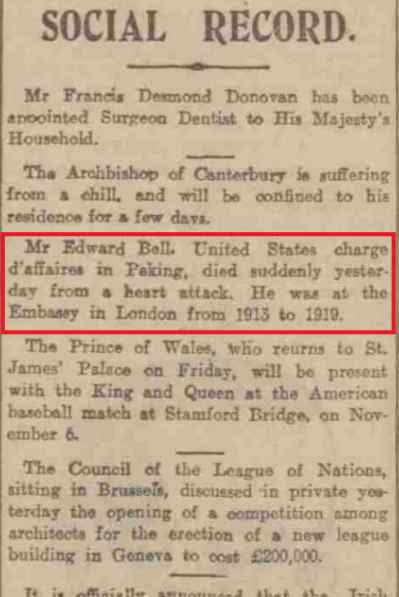Edward J Bell
(1882 – 1924)
Edward Bell's mother, Jeanette Gordon Bennett, was sister to the sportsman and publisher James Gordon Bennett Jr, their father being the émigré Scot James Gordon Bennet Sr who founded the New York Herald.
Edward himself was a close friend of Franklin Delano Roosevelt (later 32nd President of America), having attended Harvard University at the same time during the early 1900s. He became a career diplomat, and was a central figure in the contact made by Room 40 of the British Admiralty with the US Embassy in London about the sensational contents of the notorious Zimmermann telegram.
On 19 Feb 1917, following the British decoding of the Zimmermann telegram (inciting Mexico to declare war on the United States), Admiral Reginald Hall showed the telegram to Edward Bell, then secretary of the United States Embassy in Britain. Bell was at first incredulous and thought it to be a forgery. Once Bell was convinced the message was genuine, he became enraged. On 20 February, Hall informally sent a copy to United States Ambassador Walter Hines Page. On 23 February, Page met with British Foreign Minister Arthur Balfour and was given the ciphertext, the message in German, and the English translation. Page then reported the story to President Woodrow Wilson, including details to be verified from telegraph company files in the United States. Wilson released the text to the media on 28 February 1917.
The US declared war on Germany on (about) 4 Apr 1917, thereby ensuring victory for the Franco-British-Italian (sic) Alliance, although US troops did not arrive in numbers until the following year.
Edward Bell and his Zimmermann telegram memoranda
Article in Intelligence & National Security 14(3):143–159 • September 1999
DOI: 10.1080/02684529908432556
Cite this publication
| • | www.researchgate.net/scientific-contributions/2065547598_David_Kahn
David Kahn |
Abstract
Edward Bell (1882 – 1924), the American diplomat who dealt with British intelligence in the matter of the Zimmermann telegram, which pushed the United States into World War I, has been unknown in all but his name. This note offers a brief biography and photograph. It prints two unpublished memoranda that Bell wrote giving his inside story of the telegram, written to explain why an author should not reveal its solution. Also appended are a memo about that solution and its disclosure to the Americans by the telegram's main British cryptanalyst and a note revealing the ignorance of the German minister in Mexico about how the telegram came to Allied knowledge.
Edward Bell was a close friend of F. D. Roosevelt (later 32nd President of America) having attended Harvard University at the same time during the early 1900s.
Of greater significance to this story, however, was his marriage to Etelka Surtees, an Englishwoman, and his daughters Virginia and Evangeline.
He died prematurely, aged just 42.

Contemporary reports suggest that he was
heavily addicted to the bottle.

